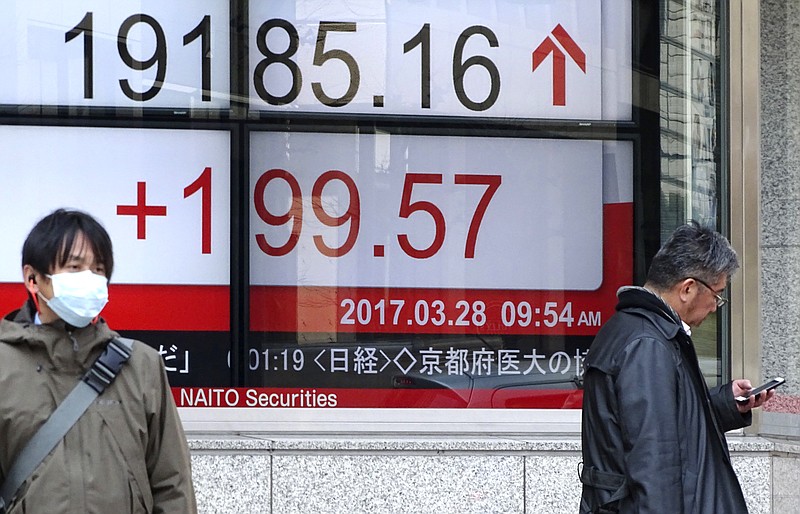BEIJING (AP) - Asian stock markets rose Tuesday after Wall Street sank on worries that the Trump administration might not do as much for businesses as once thought.
KEEPING SCORE: Tokyo's Nikkei 225 gained 1 percent to 19,174.56 and Hong Kong's Hang Seng advanced 0.5 percent to 24,317.93. The Shanghai Composite Index declined 0.4 percent to 3,255.11 while Sydney's S&P-ASX 200 added 1.2 percent to 5,816.60. Seoul's Kospi rose 0.2 percent to 2,159.54 and India's Sensex advanced 0.5 percent to 29,383.62. Benchmarks in Taiwan and Singapore rose while Malaysia and Manila declined. New Zealand was unchanged.
WALL STREET: Worries that Washington may not be able to help businesses as much as once thought knocked stock indexes down hard early Monday, but they clawed back most of their losses and ended the day mixed. The Standard & Poor's 500 index fell 2.39 points, or 0.1 percent, to 2,341.59 for its seventh drop in the last eight days. The Dow Jones industrial average sank 45.74 points, or 0.2 percent, to 20,550.98, while the Nasdaq composite index rose 11.64, or 0.2 percent, to 5,840.37. When trading opened for the day, it looked as if losses would be much worse. The S&P 500 sank from the start and was down as much as 0.9 percent.
TRUMP SLUMP?: Last week's failure by Republicans to repeal the Affordable Care Act, which they have pledged to do for years, raised doubts that Washington can push through other promised changes to help businesses. Investors have been anticipating that President Donald Trump and the Republican-led Congress will cut taxes, loosen regulations for companies and institute other corporate-friendly policies.
ANALYST'S TAKE: "Markets appear reluctant to take the Trump disappointment too much further at this stage," Ric Spooner of CMC Markets said in a report. "With U.S. economic growth showing signs of improvement and the Fed clearly embarked on a monetary tightening cycle, the significant correction that has already occurred in bonds and the U.S. dollar may already reflect an adequate wind back of the market's Trump exuberance."
AIRLINE TIE-UP: American Airlines has agreed to pay $200 million for a stake in China Southern Airlines, one of China's three major state-owned carriers, in a bid for a bigger share of the country's growing travel market. China Southern will expand commercial cooperation, possibly in sales, airport facilities and code-sharing, the airline said in an announcement Tuesday through the Hong Kong stock exchange. Foreign carriers are forging steadily closer ties with Chinese airlines to gain a bigger share of China's travel market, which is growing while travel in Europe and North America is leveling off. In exchange, Chinese carriers get access to the experience and management skills of foreign airlines.
KOREAN GDP: South Korea's central bank raised its estimate of economic growth in the final quarter of 2016 by 0.1 percentage point to 0.5 percent over the previous quarter. The bank said government consumption and investment in construction and intellectual property products turned out better than advance figures indicated. Exports were revised up by 0.7 percentage point to 1.2 percent. The central bank also revised up full-year 2016 economic growth by 0.1 percent to 2.8 percent, citing better construction investment and exports.
OIL SINKS: Oil prices have sagged below $50 - a boon to importers but a blow to developing countries that rely on crude sales to pay for imports. Benchmark U.S. crude could fall to $40 per barrel before tight oil producers cut back and supply stops increasing, Carl B. Weinberg of High-Frequency Economics said in a report. "Oil-producing emerging economies will earn less foreign currency," said Weinberg. "This will impair their ability to import: World trade will resume its persistent decline."
ENERGY: Benchmark U.S. crude gained 24 cents to $47.97 per barrel in electronic trading on the New York Mercantile Exchange. The contract fell 24 cents on Monday to $47.73. Brent crude, used to price international oils, rose 19 cents to $51.09 in London. It lost 2 cents the previous session.
CURRENCY: The dollar was unchanged at 110.65 yen. The euro edged down to $1.0863 from $1.0864.
